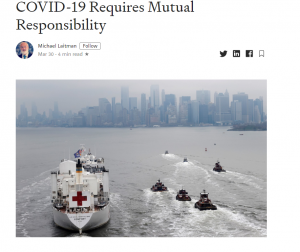
There is ample talk about COVID-19 being a punishment from nature for humanity’s mistreatment of it. I respectfully disagree. As I see it, there are no punishments in nature; there are natural laws. Gravity, for example, is a natural law. If you jump off the roof of a high-rise thinking you can fly, you will die even if halfway down you’ll be enjoying the view and the wind in your face thinking that life is smiling at you. But if you obey the law of gravity and stay on the solid roof, you’ll be safe.
For centuries, humanity has behaved like that fool on the roof, pretending to be what it’s not: the sole ruler of Earth. We jumped too high and now we’re free-falling down. On our way down, we celebrated our achievements and said, “So far so good.” But we have been misled by our self-centered nature that twisted our perception of reality. Now, as the ground beneath us is nearing fast, there is but one parachute that we can open and stop the free-fall: to align human nature with the rest of nature. Nothing else will prevent the collision with the asphalt underneath.
Castles in the Sand
In a matter of weeks, the coronavirus has stopped civilization in its tracks. Tourism, transportation, sports, entertainment, culture, industry, education, socializing, and even our ability to congregate for prayer have all been halted. In short, the virus stopped our lives. Most still have basic sustenance such as food and shelter, but even this is doubtful going forward.
At the same time, in those few weeks, COVID-19 has also managed to restart many aspects of nature that have been suppressed by humans. The air in China is clear for the first time in decades, and you can see the fish swim in the once murky water in the canals of Venice, where swans swim after so many years of absence. Nature is palpably rejuvenating. It is not retaliating against humanity; it has merely separated us from the rest of nature and is restoring harmony and balance.
Coronavirus is sending us a message: Human nature, which engendered the civilization we so value, is at odds with the rest of nature. It is damaging to the rest of the world and injurious also to us humans.
The world we live in is the reflection of the interactions among its parts. While nature develops through harmonious collaboration, we have been driven by the struggle for power and control. Like naughty children building castles in the sand, we have been fighting to build our castles and smash everybody else’s until the tide came and washed them all away, so we could start over properly.
Homeostasis and Mutual Responsibility
When wolves were hunted to extinction in Yellowstone National Park in Wyoming, USA, the entire ecosystem suffered. Overpopulating herbivores depleted the flora, streams deviated from their course due to lack of riverbank vegetation, and animals’ health deteriorated as the weak and the sick were not culled by predators. When the wolves were reintroduced into the park, balance and health were restored.
The natural law that guides this balance is known as “homeostasis,” which is defined as a tendency toward a state of equilibrium between different but interdependent elements or groups of elements of an organism, population, or group.
We, humans, are devoid of the instincts that maintain homeostasis in the rest of nature. Instead, we must develop it consciously and willingly. The human homeostasis will not be a natural law that guides us, but a social guideline that will form the basis of our society. That guideline will be “mutual responsibility.” Like homeostasis, mutual responsibility implies a tendency toward equilibrium between different yet interdependent elements. But in humans, it is a conscious tendency rather than inherent.
If we introduce mutual responsibility into our societies, we will be able to continue to grow and thrive as a human society. If we avoid it, nature will force us to behave in a more balanced way, as the coronavirus is doing today. And the more adamantly we refuse, the more aggressively nature will force us to comply.
In practice, introduction of mutual responsibility should occur on the physical level and on the intellectual level. On the former, governments will have to tend to people’s basic needs for food, healthcare, and housing. On the latter level, we must establish an online education system where scientists and other pundits introduce the notion of mutual responsibility and explain why today’s reality requires it.
The idea behind these educational programs is not merely to help humanity overcome the virus. Rather, the idea is to change the paradigm that governs our lives, from focusing on the “me” to focusing on the “we.” The old paradigm is why the coronavirus has arrested our civilization, so we could build one that is based on mutual responsibility, and any moment’s delay is one moment too late.
Featured in Medium